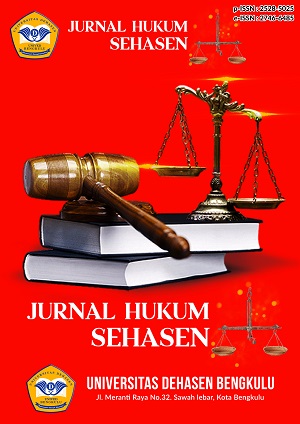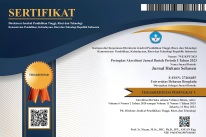Legal Analysis Of Criminal Offences Regarding Registere Trademarks Of Similarity In The Whole
Abstract
Legal events of the crime of equality of registered trademarks as a whole often occur in Indonesia. This is marked by the number of complaints from registered trademark owners to the police and trademark dispute cases heard in court. Similar but not the same in the lawsuit/demand of the trademark owner against the perpetrator of the violation of the law against the trademark is carried out by the perpetrator with the imitation of the brand as a whole, so that it has an identical resemblance both in the logo on the image and in the form of writing and pronunciation. Where the perpetrator's act of piggybacking on the owner's registered brand is motivated by personal interests so that the counterfeit brand products he uses instantly can compete with well-known products and bring great profits to him. Even if they are aware and/or unknowingly, these acts can have legal consequences that have consequences for the imposition of legal sanctions from the criminal act of equality of registered trademarks as a whole. This study uses a normative juridical approach method, using qualitative analysis techniques which are then presented and analyzed using analytical descriptive methods. The type of approach used in writing this thesis is the library research approach, namely by studying books and documents related to the form of the crime of registered trademark equality as a whole, the causes of the crime of imitating registered trademarks, and the analysis of the decision Number 259/Pid.Sus/2019/PT SMG.This study also uses the statute approach method, namely by reviewing laws and regulations related to the topics discussed in this study, namely based on Law Number 20 of 2016 concerning Trademarks and Geographical Indications. The results of the research and discussion in this study found that based on the decision Number 259/Pid.Sus/2019/PT SMG. In the process of his trial in court, the judge found evidence and facts that the perpetrator had indeed committed an act of violation of the law against the crime of equality of registered trademarks as a whole and was found guilty of imitating the "Ndang Ndut" brand as a whole by using the "Abang Gendut" brand on his salt products sold in the market. This act of bad faith clearly harms the brand owner in terms of revenue and damages the market strategy that he has implemented, especially deceiving consumers as if the marketed product has the same quality even though it is different.
Downloads
Copyright (c) 2024 Rovi Satria Perdana Putra, Nursariani Simatupang, Mhd Teguh Syuhada Lubis

This work is licensed under a Creative Commons Attribution-ShareAlike 4.0 International License.






